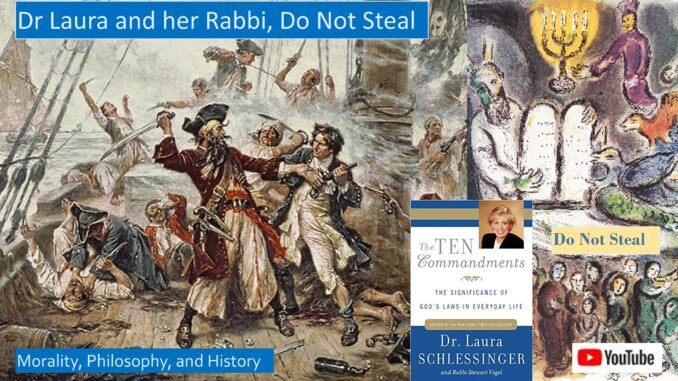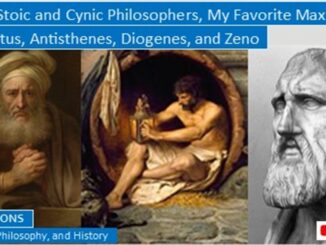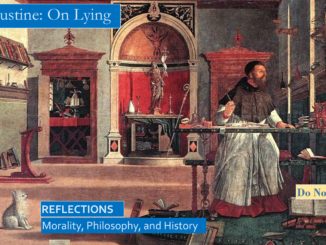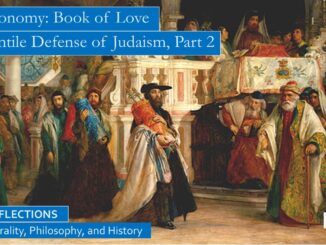
Today we will reflect on the chapter in the book by Dr Laura and her rabbi on the Commandment, Do Not Steal. This book has much practical advice on how to live a godly life in the modern world from observations by Dr Laura and her viewers.
Dr Laura has heard these questions many times:
“Is it stealing when it’s from a company or government, instead of from people?
Is it stealing if they really wouldn’t notice it’s gone because they have so much?
Is it stealing if it’s not fair that I don’t have what so many other people have?
Is it stealing if I mean to give it back eventually before they notice or need it?”
DR LAURA: DO NOT STEAL
Quite often, when you break one command, you break many commands, and this is especially true of theft. Envy precedes theft, adultery steals affection from your neighbor’s wife, murder steals a life, bearing false witness steals your neighbor’s reputation, and even dishonoring your parents or those in authority steals the respect that is due them. Dr Laura also discusses sexual abuse, when innocence is stolen.
Dr Laura opens this reflection: “People spend a lot of time redefining stealing in order to increase their comfort zone as they assert themselves in a world of needs, wants, possessions, power struggles, fame, fortune, desire, envy, loss, hurt, greed, and antisocial personalities.” This observation implies that many people steal because they feel that they are being taken advantage of, or they themselves were the target of loss, hurt, and greed, and they want to get even with the world, though she does not develop this thought in depth.
What sets apart Dr Laura’s discussion of this commandment, even when compared to the preachers and the Church Fathers, is her retelling of the many excuses her listeners have given over the years to justify theft. The commentary on this commandment is sparse, perhaps because it seems so terse, THOU SHALT NOT STEAL.
Many of Dr Laura’s listeners were calling in to her show to find someone to reassure them that they were okay, and often our friends and acquaintances may do the same with us, we all need to push back when we are asked to be complicit and not condone harming our neighbors.
Just as courts award extra punitive damages against egregious crimes, so the Torah exacts penalties for theft. In Exodus 22, those found with stolen goods must pay back the victim double what he stole. In Numbers 5, when a thief confesses his sin, he must pay the victim back what he stole, plus twenty percent. Especially egregious is the theft of valuable farm animals. In Exodus 21, the thief must return five oxen for every one stolen, and four sheep for everyone stolen. In the Wild, Wild West the horse thief was hung.
In Exodus 2, the thief could be sold into slavery if he could not repay the victim the principal, but not the penalties. Or he could work to pay off his debt for no more than six years, because the Torah requires that all slaves be freed in their seventh year of service.
Kidnapping is seen as stealing a life, Exodus 21 condemns kidnappers to death. That same chapter also punishes masters who steal from slaves, freeing them if their master blinds a eye or knocks out a tooth. Another type of modern kidnapping Dr Laura discusses is when one parent moves far away after a separation or divorce, stealing them from the other parent, often lying by telling them their children that the other parent doesn’t want them or love them.
Dr Laura then lists the many excuses many people give to justify theft.
I DID NOT KNOW IT WAS HOT
Dr Laura reminds us that “a Jewish law states that it is forbidden to buy something from a known thief even if he assures you that it is not stolen.” “When you buy stolen property, you are an accessory to a theft, which is as great a crime as the theft itself.”
FINDERS KEEPERS, and I DIDN’T STEAL IT – THEY MADE A STUPID MISTAKE
If you find something and have no way of knowing who it belongs to, and there is no LOST AND FOUND department to return it to, then you can keep it. But you must return it if you can. The Torah requires in Exodus 23 that you return your enemy’s ox or donkey if you find them wandering the countryside. In modern times, we should alert a clerk if they make an error counting cash in our favor, if we don’t, we are thieves.
Dr Laura reminds us, “While it may not be illegal, it certainly is immoral knowingly not to pay fair price for your purchases, regardless of the IQ level of the clerk.”
IT IS ONLY FAIR CONSIDERING ALL MY PAST BAD LUCK AND PROBLEMS!
Just because others have taken advantage of you in the past, does not excuse you from taking advantage of others today. Likewise, you shouldn’t cheat on your taxes if you think the government is wasting your tax dollars.
Dr Laura tells us of a listener who thanked her for nagging everyone, she had filed an insurance claim for a lost wedding ring, but canceled the claim when she found the ring. There was also a viewer who caught a hundred-dollar error in their favor on their last paycheck and offered to pay it back.
I DESERVE IT BECAUSE I DON’T HAVE IT!
Dr Laura retells the story of an armored car wo crashed in a low-income neighborhood, spilling thousands of dollars of dollar bills, which were eagerly scooped up by the surprised residents. In interviews in the local newspaper, many of these poor saw this as a gift from God. But stealing is never right.
I am surprised she didn’t repeat the story I have heard on the news several times over the years, where a department store calls the police to arrest a shoplifter. Sometimes when the thief is a struggling single mother stealing for her child, the police will pay her bill themselves so they don’t have to arrest her.
Stealing is never right, but it is also not right to pay someone starvation wages. St John Chrysostom teaches us that when we do not give alms to the poor, we too are guilty of theft. Surely he would tell modern day employers that they should not pay starvation wages.
IT IS NOT HURTING ANYONE!
In this section, Dr Laura mentions those who feel it is okay to cheat on their taxes, to fudge insurance claims, to file frivolous lawsuits, and to take dishonest advantage of generous return policies of stores. These losses are paid by higher prices and taxes by everyone in society.
I WAS ONLY BORROWING IT!
This is a tip from one of Dr Laura’s listeners: “Never take it for granted that just because you live in the same house with someone you are at liberty to take or use their personal things. This behavior usually leads to taking liberties with other people who do not live in the house.”
After college, I worked as a CPA for an accounting firm that performed external audits. Fortunately, I did not encounter fraud on any of my audit engagements, but several of my associates did. One was the classic situation where the bookkeeper borrowed cash from an outstanding deposit listed on the bank reconciliation. In a sad situation, the divorced accountant created bogus credits on his personal credit cards that were booked as customer refunds. He then was able to afford the purchase of plane tickets to visit his kids. A very sad situation, my recollection is he was only fired, they declined to alert the police.
Typically, these “borrowings” start out small, but when the thief discovers how easy it is to borrow, they start borrowing more and more, until the fraud becomes more and more obvious. The typical way to guard against fraud is to follow good internal controls. One key control is to avoid having the person doing the accounting and bank reconciliations also handle the cash, which is a separation of duties.
HE DESERVES IT!
Why steal from someone just to get back at them? Another one of Dr Laura’s listeners said, “I used to steal from my mom because I thought it served her right. Then my sister began to steal from me. I guess that served me right. I am now a little wiser at twenty-three.”
IT’S NOT HURTING ANYONE!
Have you ever gotten discounts for your children at the movies by lying about their age? If so, Dr Laura, and the Torah also, do not approve. This category also includes those who use bootleg software.
My favorite Roman Stoic Philosopher Epictetus tells us of someone who stole his lamp one night, he got the better end of the exchange. For Epictetus only lost his lamp, but he kept his faith. The man who stole his lamp, in exchange for the lamp he consented to become a thief, becoming faithless.
Epictetus, Stoic Philosopher
http://www.seekingvirtueandwisdom.com/epictetus-discourses-blog-1/
http://www.seekingvirtueandwisdom.com/epictetus-discourses-blog-2/
https://youtu.be/Dhd543kov-E
EVERYONE ELSE DOES IT!
Morality is not determined by taking a vote, or a poll. As Dr Laura reminds us, “The more frightening version of this excuse is gang and mob mentality. It is true that larger groups of people are capable of greater evil than most of the individuals would commit independently. The mob gives each individual permission and acceptance for base behavior.”
After the Civil War,
Arendt, holocaust, german interviews
ALL IS FAIR IN LOVE, WAR, AND IN BUSINESS
Dr Laura tells us that “the rabbis forbid you to ask a merchant for a price if you are not interested in buying it,” because it raises false hope. One egregious example is people who insist on wasting realtor’s time by looking at new houses when they have no intention of buying them, which not only steals their time, but can also lead to them to be envious of their neighbor.
Dr Laura quotes this exhortation of Jesus from Luke: “Tax collectors also came to be baptized, and said to him, ‘Teacher, what shall we do?’ And he said to them, ‘Collect no more than is appointed you.’ Soldiers also asked him, ‘And we, what shall we do?’ And he said to them, ‘Rob no one by violence or by false accusation, and be content with your wages.’”[1]
I WILL PAY WHEN I CAN
The Torah in Leviticus exhorts us that “The wages of a hired worker shall not remain with you overnight.” When you contract with someone to do work for you, you should pay them promptly, particularly if they are a small business such as a lawn service.
Dr Laura notes, “I get so many calls from folks whose family members borrow money and then, feeling an illicit sense of entitlement, don’t pay the debts back. Additionally, there are the folks who cheat each other out of inheritances because they feel emotionally entitled.”
My additional advice is you should never loan anything to family or friends that you cannot afford to lose, although parents will often loan large amounts to their children for critical purposes, like a down payment on a house.
When I was involved with divorce support groups, on rare occasion, there were single mothers who were just plain stuck because they could not hire an attorney. Sometimes thoughts and prayers are not enough, sometimes you need to loan your neighbor one or two thousand dollars from somewhere. Fortunately, I had a relationship with an affordable divorce attorney. Sometimes I was repaid, sometimes not.
I WORK HERE – I EARN IT!
Why risk your job by stealing from your employer? Apart from the fact that stealing is wrong, the risks far outweigh the benefits. Don’t steal office supplies. Don’t cheat on your expense accounts. As Dr Laura notes, “Writing pads, pens, folders, and desk lamps are not kept in stock as door prizes” for employees. “Playing computer games, surfing the net, or even just personal reading during company time when there is work to be done is obviously stealing.” Let your boss know if you have free time, perhaps there is other work that needs to be done.
IT IS NOT MUCH
Dr Laura observes that “some people justify stealing by saying that things aren’t really big or worth much.” Many small thefts are just not worth the risk, like munching on a small piece of candy in the grocery store. If nothing else, small thefts aren’t worth the guilt involved, unless you have no conscience.
What about sneaking in candy into the movie theater? Sure, the candy at the theater is absurdly expensive. But then that is their business model, and their mall rent is sky-high, even more expensive than the candy they sell.[2]
Adding to Dr Laura’s reflections, my advice is: Don’t be scrupulous in small things to save up your sins for a whopper. I have known people who are super-scrupulous in observing their commandments but lie when it comes to selling their car, or selling their house, or stealing someone’s business from them, apparently reasoning that it is the number of sins in your life that count, rather than their seriousness.
The Catholics have the notion of mortal versus venial sins, the difference is mortal sins are so serious they deeply damage our Love for God as well as our love for our neighbor. Whether this is biblical is irrelevant, the point is that there are sins that are more serious than others. How can you tell the difference? Simple, ask the question: How much harm does this theft cause? Clearly refilling your drink at a restaurant causes a few pennies worth of harm, while cheating the owner out of his restaurant would be devastating to him.
Many parents tell their children, “Do as I say, not as I do.” What kind of moral lesson is this? Your actions teach your children more than your words. For better or worse, often you children will mirror your values, so why not teach them better lessons by your actions?
WHO STEALS MORE, THE RICH OR THE POOR?
Since her primary experience is from the listeners who have called into her, Dr Laura does not mention the responsibility that the rich have to give alms and assistance to the poor. St John Chrysostom teaches us that all we have ultimately belongs to God.
Father Kostoff on the OCA website teaches us, “St John Chrysostom once said that the most dangerous words in our vocabulary are MINE and THINE. These words divide more than they unite. They can relieve us of our responsibility toward the neighbor that God points in our direction.” St John teaches us: “I shall bring you testimony from the divine Scriptures, saying that stealing is not only theft of others’ goods, but also the failure to share one’s goods with others.” He continues: “To deprive is to take what belongs to another.” “When we do not show mercy, we will be punished just like those who steal. For our money belongs to the Lord, however we may have gathered it.”[3]
The sin that often precedes theft is covetousness and envy, that was our first reflection on Dr Laura views on the Decalogue.
Do Not Envy: Dr Laura and Her Rabbi Stewart Vogel on Ten Commandments
http://www.seekingvirtueandwisdom.com/dr-laura-and-her-rabbi-stewart-vogel-on-ten-commandments-do-not-envy/
https://youtu.be/4G-k8NfvZJ8
And also the commandment, Do not bear false witness, or do not slander.
Do Not Slander: Dr Laura and Her Rabbi Stewart Vogel on Ten Commandments
http://www.seekingvirtueandwisdom.com/dr-laura-and-her-rabbi-on-not-bearing-false-witness-against-your-neighbor/
https://youtu.be/tlTymS2Bxxo
DISCUSSING THE SOURCES
Dr Laura’s book on the Ten Commandments is surprisingly helpful, which is surprising since her competition is not books from the likes of Dr Phil and Oprah and Joel Osteen, but rather the Church Fathers, the Greco-Roman Moral Philosophers, and preachers and scholars over the ages. Why? First, she had the humility to co-author the book with her Rabbi Stewart Vogel, plus she has many great observations from the many years she did her call-in counseling show on the radio, and now the internet.
Although her main audience is stay-at-home moms, I enjoy popping over to her website to listen to a few interesting calls.
[1] https://www.biblegateway.com/passage/?search=luke+3%3A12-14&version=RSVCE
[2] Dr Laura Schlessinger and Rabbi Stewart Vogel, “The Ten Commandments, The Significance of God’s Laws in Everyday Life (New York: HarperCollins, 1998), The Eighth Commandment, pp. 235-267.
[3] https://www.oca.org/reflections/fr.-steven-kostoff/st.-john-chrysostom-who-is-the-poor-man-and-who-is-the-rich




Be the first to comment